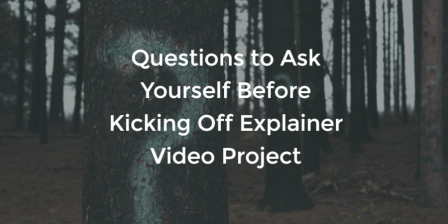August 3, 2016

You’ve read a lot about explainer videos and you’ve decided that one is the best way to deliver your message and showcase your brand. But when you’re about to kick off the project, you realize that there are still a lot of things to decide before the final cut is in your hand.
Don’t worry: Almost every startup has this problem before kicking off an explainer video project. You don’t need to have everything settled. In fact, part of our job as an explainer video company is to work with you in figuring out what’s best for your brand.
Walking you through the process and providing you with all sorts of options is part of what we do, unless your contract says otherwise.
Although these questions might answer themselves down the line, it’s good to have ideas about what you want. It improves the quality of the process and final outcome. Generally, these are the questions you should ask yourself before kicking off an explainer video project.
A. Timeframe, budgeting, and general questions
The general aspects of a project include timeframe, budgeting, and the explainer video’s overall result. Asking yourself these questions will help both you and the animation house you’re working with to adjust time effectively so your project does not collide with the other projects on their plate.
- What is the due date of this project?
- How long is this video going to be?
- Is there a specific format required for the final cut?
- Do I have enough time to manage this project?
- Is an explainer video really what I need to spend my marketing budget on right now?
B. Message and Content You Want to Deliver
The message is the most important part of an explainer video. It’s the deciding factor for the script, regardless of whether you want to write the script yourself or outsource it. Once you have these questions answered, you will have a blueprint for your explainer video.
When you come to explainer video companies with all of this figured out, most will be more than happy to work with you. But note that even if you have precise ideas about your video’s messages, there will be some changes down the line.
- What is the video’s general message?
- What kind of audience is this explainer video aiming for?
- Are there specific points that DEFINITELY, POSITIVELY need to be put in this explainer video?
- On the flipside, is there any topic that must NOT be touched?
- What makes my product better than the competition?
C. Illustration and animation style
Having a pre-set visual preference hugely helps the illustrators who work on the project. They are artists; their creativity is limited to their imagination. Provide them with a slice of yours, and they’ll deliver your idea back with a twist of creativity.
Again, this can often change as you and the explainer video company work together.
- Is there a certain animation style that I prefer over the others?
- Will that animation style work with the message I want to put in this video?
- Is there any explainer video that I want to use as a reference?
D. Branding guidelines
According to Forbes, brand humanization leverages the power of networks of people to help tell stories about your brand and company culture. Waiting to think about workplace culture and brand until you need to recruit new talent is like closing the barn door after the horses have left.
These questions should help you picture how your explainer video should look according to your company’s cultures and characteristics.
- How should I present my brand? Casual or serious?
- If my brand were a person, what would s/he be like?
- Do I want a certain logo and/or any particular asset included in the explainer video?
E. Call to action
A call to action comes at the very end of your explainer video, so it means you have important questions to answer. These questions seem simple and typical, but the answers differ from one company to another because each company executes their campaign differently.
- What’s the action I want viewers to take after watching this explainer video?
- Is there any website, email, or phone numbers I want viewers to contact?
Answering these are not a MUST and not having any answer is okay, but consider how much answering these simple questions beforehand will speed up the project and improve its outcome.
Digital & Social Articles on Business 2 Community(21)
Report Post




